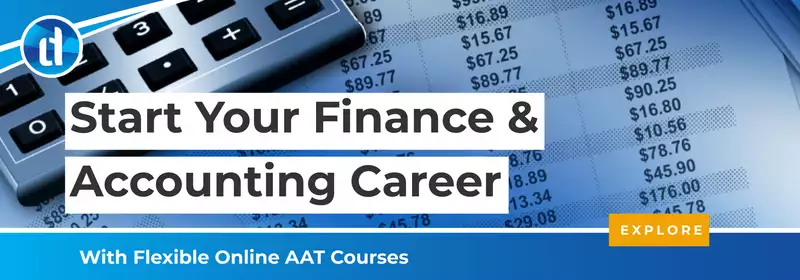Qualified accounting and finance professionals are sought-after in many industries and demand shows little sign of slowing down. With ample opportunities on offer, desirable salaries and multiple ways to further your career, it clearly pays to get qualified. But, with many ways into the field, it can be hard to know how to start learning finance and accounting.
Both disciplines involve mathematical thinking and an understanding of monetary matters in the context of business. Accounting focuses on the ongoing management of financial reports and records across the business. Whereas finance uses that information to project future growth and analyse expenses to create financial strategies.
Each requires mathematical skills, a head for numbers, stats and a keen eye for detail. To be trusted with managing the financial health of a business means you need to know your stuff.
To get qualified, you need to complete professional or degree level qualifications. But the route up to that point can either be hands-on or academic, depending on how you like to learn.
There are also several ways to develop your skills and give you a taste for working in the finance industry.

How to get Started in Finance and Accounting
Today, there are so many ways to educate yourself on a new subject. You can use resources like books, academic papers, blogs and videos, in combination with accredited online courses and qualifications. Alongside this, businesses and education providers also deliver work-based education to benefit those who prefer to learn in a practical environment.
All of which allow you to build your knowledge and take on new information in ways that suit your learning style. The different ways you can start learning and get qualified in finance and accounting are:
On the Job Training
Some accountancy and finance firms offer school leaver programmes that allow you to move into the industry without relevant qualifications. After gaining employment, you’ll work towards getting qualified by combining work-based learning with study over a five-year period. The framework of these programmes is arranged by the business itself. So, you need to check it provides the experience, opportunities and qualifications you’re looking for to progress your career.
More commonly, the work-based route people go down is an apprenticeship as these are more widely available. Apprenticeship accredited businesses also follow a national framework so you can be assured your education and training is governed. You’ll be employed to work at least 30 hours per week in finance and accounting related roles while studying a regulated qualification.
This allows you to take what you’ve learnt from your course and apply it immediately in the workplace. Helping you to fully understand each concept and practice what you’ve learnt so it’s not forgotten.
Besides gaining valuable work experience while achieving a qualification, apprenticeships enable you to qualify faster than going to university.
College Courses
A popular option to gain valuable skills and dip your toe in the finance field is through college courses. You can study anything from A-level Accounting, business accounting or business finance, to a finance and accounting certificate. These courses are a great way to develop skills that will prove useful in most careers. As well as knowledge that you can apply in further education courses.
College courses these days can be studied both on and offline. Both options are great to expand your knowledge and gain industry skills, but there are differences between them. In an offline, regular campus setting, you’ll work through your course with the support of a teacher. They will help you learn and understand each concept and you’ll progress with the pace of the others in class.
Generally, there are fewer courses available offline since the ones provided need to be popular enough to cover their overheads. Of which there are more in campus education.
With online colleges, there are fewer expenses which enables more course variety. You can find a diverse range of finance and accounting courses to suit your specific need. And while you may not be taught by a teacher, you’ll have professional tutors on hand to help. Plus, you can progress through the course at your own pace. Allowing you to qualify as soon as you’re ready and move onto the next step in your goal.

University
Degrees are a great option if you prefer to gain a thorough academic understanding before work-based training. They generally run over 3 years unless you decide to include a placement year to gain valuable hands-on experience.
It’s also possible to take joint accounting and finance degrees so you can gain skills across both areas. This generally allows students to see where their preferences lie, and most choose one avenue to specialise in later on.
Undergraduate degrees you can study include:
- BA Hons Accounting
- BA Hons Finance
- BA Hons Accounting & Finance
- Joint degrees which couple Accounting & Finance with subjects like Economics, Mathematics or Business.
Many specialist roles in accounting and finance require postgraduate qualifications. To help you stand out, you could then complete:
- MA Accounting & Finance
- MSc Accounting & Finance
- Pre-Masters Accounting
- PGDip in Business Management & Accounting
Vocational Courses
Currently, the quickest way into the finance sector is through industry recognised vocational courses like those offered with the AAT. Studied online at your own pace, these courses can be completed quickly. They also provide you with practical, real-world accounting and finance skills that are desirable to employers.
With courses in accounting, bookkeeping and essential skills, there’s something to suit every interest. Plus, they have different levels available which take you from novice to pro, and ready to study your professional exams.
AAT qualifications are universally respected and internationally recognised. So, you can gain skills you can take with you around the globe. What’s more, they’re regulated by all four UK qualification regulators; Ofqual (England), CCEA (Northern Ireland), SQA (Scotland) and Qualifications Wales. Which assures you of their quality and effectiveness at equipping aspiring accounting and finance professionals with the necessary skills.

Start Learning Finance and Accounting Online
So, no matter your preferred style, there are many ways you can start learning finance and accounting.
If the idea of flexible learning appeals to you, online courses are a great way to upskill around your busy lifestyle. You can study at home, or from wherever suits, to get the qualifications you need for a new career.
With no experience required, you can get started with the AAT courses today. There are flexible payment methods available and once you enrol you can receive assistance from a professional online tutor.
With their foundation certificates qualifying you for entry-level roles, your career in finance can start sooner than you might think. And with their advanced certificates and diplomas, you’ll be ready to pursue senior positions with ample progression opportunities.
Stop contemplating your future, Instead, make it a reality by learning finance and accounting with highly regarded vocational courses.
Find out more about the Association of Accounting Technicians (AAT) in our blog. Or click below to view their courses in more detail.
learndirect is the leading UK distance learning provider. With many online courses to help you achieve your learning goals.



















